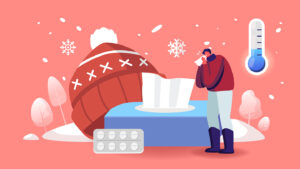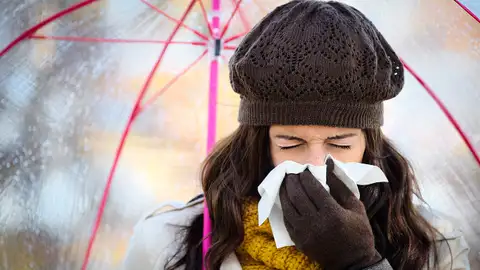Why cold air and warm viruses combine to make winter a breeding ground for viral infections. As the world outside becomes covered in a layer of frost during the cold winter months, our respiratory systems frequently face a different kind of struggle.
With its warm sweaters and steaming chai, the winter season also serves as a breeding ground for respiratory ailments that subvert the body’s defenses. It’s a contradiction of the seasons—a season when sore throats, sniffles, and sneezes are the main events.
Imagine yourself stepping outside into the refreshing cold winter air, only to find tiny, unseen adversaries lurking around. As we breathe, bacteria and viruses that are hiding in the chilly air take advantage of our nasal passages as a battlefield.
The low humidity makes these microscopic invaders grow, and our respiratory passages become a pleasant habitat for them.
A VIRAL WONDERLAND DURING WINTER
A few kilometers away from the bedroom, the Outpatient Department (OPD) experiences an abrupt surge in traffic, with a multitude of individuals sneezing, coughing, and becoming extremely hot and bothered, further taxing the already overworked medical staff.
However, why is this rise in respiratory ailments related to winter? The relationship between cold air and our lungs was described by microbiologist Dr. Vivek Nangia, Principal Director & Head, Pulmonology, Max Super Speciality Hospital, Saket, New Delhi.
Sometimes the chilly air we breathe in does not get sufficiently warmed up or humidified, and as a result, it enters our lungs straight. Thus, direct exposure to cold air can occasionally result in bronchoconstriction and bronchospasm, which can lead to asthma.
Thus, it implies. breathing in cold air can cause the airways to narrow, creating an asthmatic-like condition, according to Dr. Vivek Nangia.
The idea behind cold, dry air
The air is more moist during warm months, which makes infectious droplets larger, according to the Mayo Clinic. Following their descent to the earth, these droplets lessen transmissibility at lower elevations.
However, because the air is drier during the winter, virus-carrying droplets remain in the air longer and spread more quickly. This explains why the virus lasts longer in the upper respiratory tract.
Internal Collection and Development
However, that isn’t the only winter offender. Imagine warm parties inside with the windows tightly closed to keep out the bitter cold. Respiratory viruses take root in recycled air and flourish in confined spaces. We unintentionally foster a climate that is conducive to the transmission of infections when we gather together to ward off the winter chill.
The head of the clinical labs in the microbiology department of Amrita Hospital in Faridabad, Dr. Anubhav Pandey, noted that decreased immunization rates and air pollution are important contributing reasons to illness.
THE VIRAL INFECTION’S EXTERNAL FACTORS
CK Birla Hospital in Gurugram’s Head of Critical Care and Pulmonology, Dr. Kuldeep Kumar Grover, provided a list of additional outside variables that hasten the transmission of viruses throughout the winter.
Crowding indoors: People naturally spend more time indoors and cluster closer together in homes, offices, and schools as the weather turns colder. This makes it more likely that you will come into close contact with someone who is infected, which facilitates transmission.
Reduced amounts of vitamin D: Vitamin D, which is essential for immune system function, is produced naturally by sunlight exposure.
But since we get less sunlight in the winter, we could become vitamin D deficient. This may further impair immunity and increase a person’s susceptibility to illnesses.
Reduced wind: The winter months see very little wind, which increases the stability of pollutants and viruses in one area. As a result, more people breathe in these spores, which increases the number of illnesses.
Our respiratory systems fight silent battles against invisible enemies that take advantage of the winter cold as we go through this season, geared up against the chill. Wearing a mask, getting your yearly immunization, and dressing in layers to be warm are all recommended by experts.
When you curl up with a cup of steaming tea or freshly brewed coffee under the covers, remember to take these easy steps to help your body’s antibodies fight and prevail.




























